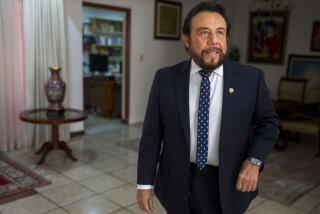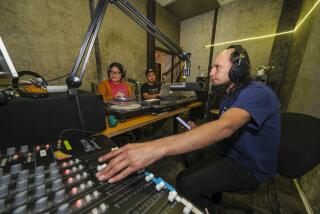Shultz Calls for Liberian Economic, Political Reforms
- Share via
MONROVIA, Liberia — Secretary of State George P. Shultz bluntly told Liberian President Samuel K. Doe on Wednesday that his impoverished West African country must reform its chaotic economy and open up its political system if it hopes to see a resumption of U.S. aid.
Shultz told a press conference that Liberia has already made substantial human rights progress since the bloody 1980 coup that brought Doe to power. But as Shultz and his party were driven from the airport to the presidential palace, four demonstrators were arrested for displaying placards calling for “free and fair elections.”
Doe, a former army sergeant, was elected “civilian” president in 1985, officially winning 51% of the vote in an election that Western observers said was fraudulent.
According to a senior U.S. official, Shultz used his 75-minute meeting with Doe to “tell him it was very important to live up to the return to civilian rule” by improving the regime’s human rights performance.
“If your jails are free of political prisoners (as Doe claims), keep them that way,” Shultz reportedly told the Liberian leader.
But the official said that Shultz placed even greater stress on his call for economic reform.
In a speech at a luncheon given in his honor, Shultz said that “fiscal austerity in the short run is essential for long-term prosperity,” and added: “We hope that the United States can continue to find ways to assist Liberia to restore its past prosperity, but can only do so to the degree that Liberia is willing to help itself.”
Later, as a symbolic demonstration of U.S. support for political reform, Shultz met for 40 minutes with eight opposition politicians representing all four of the parties opposing the Doe government.
The senior official said the session was intended to serve two purposes--as a signal to Doe that the United States will not turn its back on opposition leaders, and to urge the opposition to take a more active part in the system despite its shortcomings.
‘Express Your Views’
At his press conference, Shultz remarked: “Whatever the imperfections (of the system) . . . if you are elected to the National Assembly as many opposition leaders were, it’s a good idea to take your seat and express your views.”
The senior official said that both the Doe government and the opposition look to the United States for advice and support, placing Washington in a unique position to influence events here.
Although the opposition parties have not formulated a common program, the official said, they all urge the United States to reduce military aid to Liberia, a step that they hope would reduce the coercive power of the regime. The official said that U.S. military aid has been declining steadily in recent years “because we are sensitive to that point.”
U.S. officials say that Liberian government spending is totally out of control, even though the regime has regularly failed to meet its payroll on time. Many government bills have gone unpaid, although the regime recently laid out $146,000 for a Mercedes-Benz limousine for the president, who refers to himself as Dr. Doe because he received an honorary degree from a South Korean university.
The country is so close to bankruptcy that a front-page newspaper story reported that a supermarket is printing scrip because Liberian currency is considered almost worthless. The Liberian dollar is officially valued at one to one with the U.S. dollar, but most Liberians will accept only American currency.
U.S. and International Monetary Fund aid has been suspended, cutting off the primary source of desperately needed hard currency to an economy crippled by the collapse of the market for its main exports, rubber and iron ore.
A total of $10 million in economic aid and $5 million in military aid for the fiscal year that ended last Sept. 30 has not been allocated because Liberia has fallen about $1 million behind in payments on previous U.S. loans. U.S. law requires that aid be suspended when a country falls more than a year behind in its payments on a U.S. loan. Also held up is Liberia’s $40.6-million allocation of economic and military aid for the current fiscal year.
Liberia was a sharp contrast to the first five stops on Shultz’s Africa tour. In Senegal, Cameroon, Kenya, Nigeria and Ivory Coast, the secretary praised his hosts for economic stability.
Shultz spent only six hours in Liberia, Africa’s oldest independent country, which was founded in 1847 by freed slaves from the United States.
Potentate’s Welcome
Doe and his regime gave Shultz a welcome suitable to a visiting potentate. A military band, wearing U.S.-style uniforms, played “Ruffles and Flourishes” and “Stars and Stripes Forever” as cannon boomed out a 17-gun salute.
Although Liberia continues to rely on U.S. support, the regime has been an embarrassment to Washington since Doe seized power in 1980. President William R. Tolbert Jr. was assassinated and 13 members of his Cabinet were publicly executed on a Monrovia beach.
At his press conference, Shultz scoffed at reports that he intends to resign.
“I heard about that report,” he said. “It was news to me. I think I would have heard about it.”
More to Read
Sign up for Essential California
The most important California stories and recommendations in your inbox every morning.
You may occasionally receive promotional content from the Los Angeles Times.










